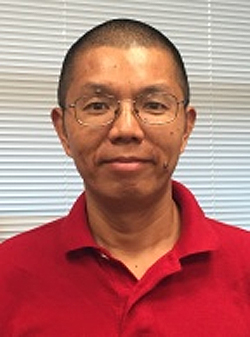
Each year, the Protein Society selects two papers in Protein Science for special recognition. This year, Qingping Xu of the U.S. Department of Energy’s Advanced Photon Source X-ray Science Division (XSD) and co-first author Matthew Biancalana (New York University Langone Medical Center) are both recognized as Best Paper awardees.
Their winning paper, “Structures of single‐layer β‐sheet proteins evolved from β‐hairpin repeats,” notes that “Free‐standing single‐layer β‐sheets are extremely rare in naturally occurring proteins, even though β‐sheet motifs are ubiquitous… Here we report the crystal structures of three homologous, single‐layer, anti‐parallel β‐sheet proteins, comprised of three or four twisted β‐hairpin repeats… These new modular single‐layer β‐sheet proteins may serve as a new model system for studying folding and design of β‐rich proteins.”
According to the Protein Society, Qingping Xu obtained his undergraduate education in physics at Anqing Normal University, Anhui, China, and took his Ph.D. in biochemistry at the University of Oklahoma. He has determined many protein structures and worked on understanding their functions through worldwide collaborations at the Joint Center for Structural Genomics consortium at Stanford, led by Ian Wilson. Qingping is currently a software developer with the XSD National Institute of General Medical Sciences and National Cancer Institute (GM/CA-XSD) structural biology facility at the Advanced Photon Source. His work at GM/CA-XSD focuses on helping synchrotron users collect better data more efficiently by developing new software and participating in user research.
The Protein Society (TPS) is a not-for-profit scholarly society. Since 1985, TPS has served as the intellectual home of investigators across all disciplines - and from around the world - involved in the study of protein structure, function, and design. TPS provides forums for scientific collaboration and communication and supports professional growth of young investigators through workshops, networking opportunities, and by encouraging junior researchers to participate fully in the Annual Symposium. As well as the meeting, the Society’s prestigious journal Protein Science, edited by Brian Matthews, serves as an ideal platform for furthering the science of proteins in the broadest possible sense.
See: Q. Xu Q, M. Biancalana, J.C. Grant et al., “Structures of single‐layer β‐sheet proteins evolved from β‐hairpin repeats,” Protein Sci. 28, 1676 (2019). DOI: 10.1002/pro.3683
The Advanced Photon Source, a U.S. Department of Energy (DOE) Office of Science User Facility operated for the DOE Office of Science by Argonne National Laboratory under Contract No. DE-AC02-06CH11357.
The U.S. Department of Energy's APS is one of the world’s most productive x-ray light source facilities. Each year, the APS provides high-brightness x-ray beams to a diverse community of more than 5,000 researchers in materials science, chemistry, condensed matter physics, the life and environmental sciences, and applied research. Researchers using the APS produce over 2,000 publications each year detailing impactful discoveries, and solve more vital biological protein structures than users of any other x-ray light source research facility. APS x-rays are ideally suited for explorations of materials and biological structures; elemental distribution; chemical, magnetic, electronic states; and a wide range of technologically important engineering systems from batteries to fuel injector sprays, all of which are the foundations of our nation’s economic, technological, and physical well-being.
Argonne National Laboratory seeks solutions to pressing national problems in science and technology. The nation's first national laboratory, Argonne conducts leading-edge basic and applied scientific research in virtually every scientific discipline. Argonne researchers work closely with researchers from hundreds of companies, universities, and federal, state and municipal agencies to help them solve their specific problems, advance America's scientific leadership and prepare the nation for a better future. With employees from more than 60 nations, Argonne is managed by UChicago Argonne, LLC, for the U.S. DOE Office of Science.
The U.S. Department of Energy's Office of Science is the single largest supporter of basic research in the physical sciences in the United States and is working to address some of the most pressing challenges of our time. For more information, visit the Office of Science website.
